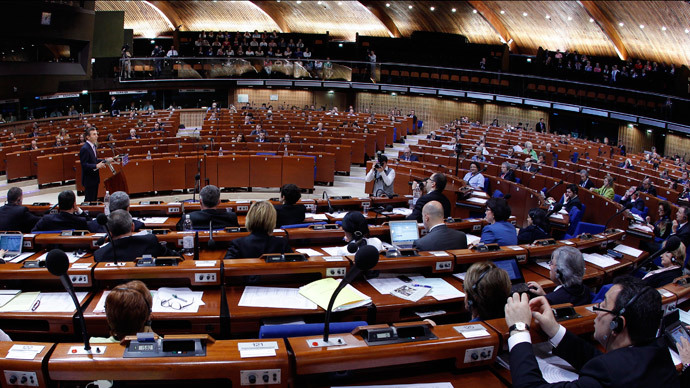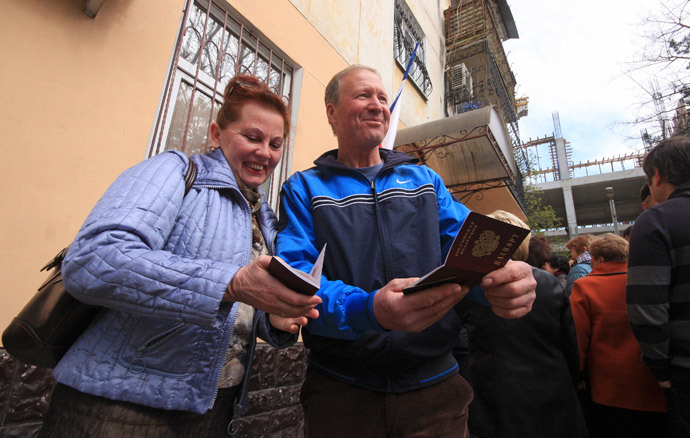Europe is hard on secessions

Faced with their own long-standing independence movements, Europeans are a tough crowd when it comes to all things related to secession.
The Parliamentary Assembly of the Council of Europe (PACE) passed a harshly-worded resolution condemning Russia’s handling of the situation in Crimea and stripping Russian delegates of their voting rights for the remainder of the year.
One of Europe’s oldest and most prestigious institutions, the Council of Europe is not part of the European Union, although the two bodies have a widely-overlapping membership. Its Parliamentary Assembly is composed of Members of Parliament (delegates) from all member States, as well as observers from Canada, Israel and Mexico.
Less than 24 hours before the PACE Resolution was passed, Spain’s Congress of Deputies rejected the possibility of a Catalonian independence referendum, despite the fact that 80 percent of Catalonians reportedly desire one, while an online referendum which delivered an overwhelming vote in favor of independence for Veneto, Italy last month, has sunk without a trace from the Italian political agenda.
Similarly, European politicians have tried to warn Scots off voting for independence from Britain in a referendum scheduled for September. They claim that it would be extremely difficult for an independent Scotland to join the European Union, given the attitudes of some of its member states to any secession, even one conducted in accordance with mutually-agreed referendum procedures.
In this hostile atmosphere, any expression in favor of independence or secession tends to go over like a lead balloon.
However, while the general tenor of any European political body in regards to questions of independence was entirely foreseeable, the resolution and its accompanying report do not represent the Council’s finest moment and they fall short of the standards of professionalism that one would normally expect from such an organization.
Double standards
Russia has repeatedly expressed concerns about extreme right-wing elements represented in the current Ukrainian government. These claims center around three persons in specific: Andrey Parubiy, the current Secretary of Ukraine’s Security Committee and co-founder of Svoboda (which was, at the time, the National Socialist Party of Ukraine, complete with the accompanying Nazi symbolism); Dmitry Yarosh, Prubiy’s deputy and leader of the Right Sector; and Aleksandr Sych, deputy prime minister and a Svoboda member.
Svoboda members also reportedly invest the posts of prosecutor-general, agriculture minister and environment minister. PACE has dismissed the presence of these officials out of hand, accusing Russia of fabricating propaganda about their right-wing sympathies to suit its own agenda.
The organization’s refusal to even engage with this point is hard to understand, especially since the same representatives are usually very concerned over any rise in extreme-right politics in their own countries.
When Austria’s Freedom Party entered a coalition government in 1999, most other European countries scaled backed their cooperation with Austria and refused to support Austrian candidates seeking positions at international institutions. In a similar vein, Hungary’s right-wing government has been under close scrutiny from other European nations for years.
At the very least, the Assembly’s refusal to conduct its own investigations shows a cavalier lack of concern on this point, which is as uncharacteristic as it is distressing.
The resolution’s accompanying report also said that claims of rights violations perpetrated against ethnic Russians living in the Ukraine were baseless. According to the report, Russia had manufactured these claims by extrapolating generalizations about violations from a few isolated incidents. This point of view would have been more understandable, if the Assembly had not unquestioningly accepted reports of similar violations against Crimean Ukrainians and Tatars in a resolution it had passed on the Ukraine only the day before.

Self-determination v territorial integrity
Of course, the body of the resolution dealt with the legality of the Crimean independence referendum.
The Western point of view has historically been that secession is always illegal, unless the parent state has agreed to an independence referendum. That this strategy has spawned a collection of armed pro-independence groups in those European countries that refuse to grant such a process is generally ignored. Under great duress, Western countries (which have traditionally called the shots when it comes to making international law) have made one exception to this rule, and that is that they are willing to consider independence if mass atrocities have been committed, provided those atrocities reach a level where reconciliation would not be possible.
This was the line taken in Kosovo, and also earlier in Bangladesh, which until 1971 was part of Pakistan. While this doctrine genuinely developed from the desire to make a minor concession to the possibility of secession, it has not produced the most coherent of policies.
Under this understanding, Crimea could have seceded after holding a referendum if only some serious human rights atrocities had occurred first. Obviously, there is a flaw in this logic, which tends to reduce a decision on principle to a contest over who can claim the most human rights violations. Under this scenario, what started out as a peaceful process can often degenerate into violence.
Russia, on the other hand, has historically been more open to the principle of self-determination, which saw its heyday in Soviet support for African decolonization in the 1960s.
Under this understanding, if a group of people decides to secede from a country and hold a referendum to that end, they should generally be allowed to do so as an expression of their right to self-determination. This is all the more so when the referendum resolves a situation of tension without bloodshed. This is not to say that Russia, or its predecessor, the Soviet Union, favor independence in all circumstances; merely that they entertain a more permissive and flexible attitude towards secession than can be found in most Western states, and one that gives greater weight to the principle of self-determination.
No exceptions
These deep differences exist, but yesterday’s PACE resolution shows, in no uncertain terms, that most Council of Europe members are not interested in a rapprochement with Russia on this point.
In fact, the resolution demands that Russia hand Crimea back to Ukraine or face having its delegates’ credentials revoked. Since absolutely no one believes that Russia will comply with this demand, or even that it would be a particularly good idea to do so, this could be a way of preparing Russia’s eventual exit from the Council should relations continue to deteriorate.
Right now, however, PACE’s point is mainly to punish Russian parliamentarians. The resolution and accompanying report make this explicit. Both documents condemn the constitutional amendments which allowed Crimea to join Russia, as well as the ratification of what PACE termed an “illegal treaty” on unification.
The report explicitly accuses Russia of orchestrating the events leading to the referendum in the Crimea (although with very little in the way of detail to substantiate this), while the resolution describes Crimea as being under the “illegal control” of Russia. It is an uncompromising stance, and the Council’s claim, made at the end of the resolution, that it would like to maintain a dialogue with Russia seems out of place after these unusually harsh words.
The way forward
In spite of all of this, it is important not to lose sight of the fact that PACE exercises very little real power. PACE itself described its resolution as merely “sending a signal.” Duty done, and having made clear exactly what they think of secession, its members might well eventually decide to brush everything under the rug, especially if the situation in eastern Ukraine stabilizes quickly. After all, we’ve all been here before during the Chechnya years, which saw similar developments within the Council.
European governments – who must always keep one eye on re-election – are likely to be somewhat more muted in their criticism than a selection of their parliamentarians, and Russia has already weathered the initial international reaction at the United Nations (although this could heat up again at the plenary session in September).
NASA has already apparently done its worst in suspending certain forms of cooperation with Russia (while leaving transport to and from the International Space Station untouched), and NATO General-Secretary Anders Fogh Rasmussen took it upon himself to threaten Russia with further sanctions should it invade eastern Ukraine. That Russia has not expressed any intentions of undertaking military action in eastern Ukraine did not seem to deter Mr. Rasmussen from preemptively delivering this - all things considered - astonishingly mild threat.
Oddly enough, despite this acrimonious and high-profile rupture, some common ground between Russia and the other PACE members has emerged. Russia has made clear that it favors a federalization of the Ukraine, which will grant greater autonomy to regions like Donetsk, where pro-Russian protests continue, and permit them greater leeway in interpreting their own cultural heritage. This coincides with a resolution passed by PACE on April 9 which advocates wide-reaching reforms in the Ukraine. These reforms include implementing a policy of decentralization, which will grant greater power to individual regions.
This small slice of common ground could be a way to progress towards resolving the crisis when the EU, US, Ukraine and Russia holds talks next week.
The statements, views and opinions expressed in this column are solely those of the author and do not necessarily represent those of RT.
The statements, views and opinions expressed in this column are solely those of the author and do not necessarily represent those of RT.













